| Listing 1 - 8 of 8 |
Sort by
|
Book
ISBN: 9788860170651 Year: 2008 Publisher: Palermo : Palumbo,
Abstract | Keywords | Export | Availability | Bookmark
 Loading...
Loading...Choose an application
- Reference Manager
- EndNote
- RefWorks (Direct export to RefWorks)
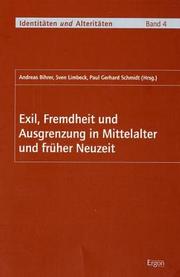
ISBN: 3933563771 Year: 2000 Volume: Bd. 4 Publisher: Würzburg : Ergon,
Abstract | Keywords | Export | Availability | Bookmark
 Loading...
Loading...Choose an application
- Reference Manager
- EndNote
- RefWorks (Direct export to RefWorks)
Literature, Medieval --- European literature --- Exile (Punishment) in literature --- Strangers in literature --- Social isolation in literature --- Littérature médiévale --- Littérature européenne --- Bannissement dans la littérature --- Etrangers dans la littérature --- Isolement social dans la littérature --- History and criticism --- Congresses --- Congresses. --- Histoire et critique --- Congrès --- -Exile (Punishment) in literature --- -Social isolation in literature --- Medieval literature --- Littérature médiévale --- Littérature européenne --- Bannissement dans la littérature --- Etrangers dans la littérature --- Isolement social dans la littérature --- Congrès --- History and criticism&delete&
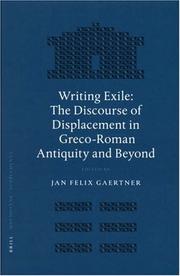
ISBN: 9004155155 9789004155152 9786611458010 9047418948 1281458015 904742543X 9789047418948 9781281458018 6611458018 9789047425434 Year: 2007 Volume: 283 Publisher: Leiden Boston
Abstract | Keywords | Export | Availability | Bookmark
 Loading...
Loading...Choose an application
- Reference Manager
- EndNote
- RefWorks (Direct export to RefWorks)
Exile and displacement are central topics in classical literature. Previous research has been mostly biographical and has focused on the three most prominent exiles: Cicero, Ovid, and Seneca. By shifting focus to a discourse of exile and displacement in early Greek poetry, Greek historiography, Cynicism, consolatory literature, Latin epic, Greek literature of the empire, and Medieval Latin literature, the present volume questions the notion of a distinct, psychologically conditioned ‘genre’ or ‘mode’ of exile literature. It shows how ancient and medieval authors perceive and present their exile according to pre-existent literary paradigms, style themselves or others as ‘typical’ exiles, and employ ‘exile’ as a powerful trope to express estrangement, elicit readerly sympathy, and question political power structures.
Classical literature --- Exiles' writings --- Exile (Punishment) in literature. --- History and criticism. --- Exile (Punishment) in literature --- Exiles in literature --- Exiles' writings, Latin --- Greek literature --- Latin literature --- Exiles --- Bannissement dans la littérature --- Exilés dans la littérature --- Littérature de l'exil latine --- Littérature grecque --- Littérature latine --- Exilés --- History and criticism --- Themes, motives --- History --- Histoire et critique --- Thèmes, motifs --- Histoire --- Greco-Roman antiquity --- Classical literature - History and criticism. --- Exiles' writings - History and criticism.
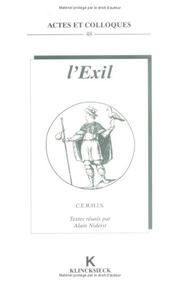
ISBN: 2252031131 9782252031131 Year: 1996 Volume: 48 Publisher: Paris: Klincksieck,
Abstract | Keywords | Export | Availability | Bookmark
 Loading...
Loading...Choose an application
- Reference Manager
- EndNote
- RefWorks (Direct export to RefWorks)
Thematology --- French literature --- Exiles in literature. --- Exile (Punishment) in literature --- Exile (Punishment) --- Exiles' writings --- Comparative literature --- Exilés dans la littérature --- Littérature française --- Bannissement dans la littérature --- Bannissement --- Littérature de l'exil --- Littérature comparée --- Themes, motives. --- Philosophy --- History. --- History and criticism. --- Themes, motives --- Thèmes, motifs --- Philosophie --- Histoire --- Histoire et critique --- Ecrivains exiles --- Exilés dans la littérature --- Littérature française --- Bannissement dans la littérature --- Littérature de l'exil --- Littérature comparée --- Thèmes, motifs --- Littérature de l'exil - Histoire et critique
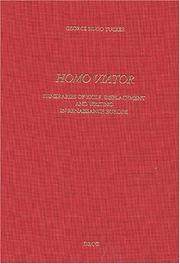
ISBN: 2600008578 9782600008570 Year: 2003 Volume: 376 Publisher: Genève: Droz,
Abstract | Keywords | Export | Availability | Bookmark
 Loading...
Loading...Choose an application
- Reference Manager
- EndNote
- RefWorks (Direct export to RefWorks)
A la Renaissance, l’écriture de l’exil ne se limite pas au discours élégiaque ovidien – qu’il s’agisse d’un exil politique ou religieux, d’une fiction littéraire ou d’un état d’âme. Liée à une réflexion plus large (stoïcienne ou platonicienne, chrétienne ou juive) sur l’exil, cette écriture se confond parfois avec le discours philosophique ou religieux de l’homo viator, tout en empiétant sur celui, scientifique, historique ou fictif, du voyage. Elle englobe plusieurs formes littéraires ou para-littéraires: récits de voyage ou de pèlerinage; allégories ou commentaires allégoriques, dialogues philosophiques ou satiriques; poésies lyriques ou didactiques. La première partie de cette étude novatrice et érudite, «Voyage et écriture, exil et identité», propose une typologie de l’exil, fondée sur les écrits de Pétrarque, de Marot et de Joannes Sambucus (Zsámboky) – ainsi que d’Horace, Dante, Rabelais, Du Bellay et Montaigne – et sur la libertas exilii. «Homo Viator» se livre ensuite à un examen de la tradition allégorique du « voyage de la vie », en aboutissant à l’ekphrasis de la Tabula Cebetis. A la lumière de ces deux premières parties, «Homo Viator: Homo Scribens » étudie enfin les écrits d’exil de Petrus Alcyonius, auteur d’un dialogue sur l’exil, des deux marranes portugais Diogo Pires et Amatus Lusitanus et de Joachim Du Bellay, ainsi que les récits d’« exil » intellectuel du voyageur Pierre Belon et de l’auteur satirique Ortensio Landi.
Literature --- anno 1500-1599 --- Europe --- Bedevaarders en bedevaarten in de literatuur --- Exil (Punition) dans la littérature --- Exile (Punishment) in literature --- Pelerins et pelerinages dans la litterature --- Pilgrims and pilgrimages in literature --- Reis in de literatuur --- Reizen in de literatuur --- Travel in literature --- Verbanning (Straf) in de literatuur --- Voyage dans la littérature --- Voyages dans la littérature --- Exile (Punishment) in literature. --- Travel in literature. --- Pilgrims and pilgrimages in literature. --- European literature --- Bannissement dans la littérature --- Pèlerins et pèlerinages dans la littérature --- Littérature européenne --- History and criticism. --- Histoire et critique --- Exiles in literature. --- History and criticism --- Bannissement dans la littérature --- Voyage dans la littérature --- Pèlerins et pèlerinages dans la littérature --- Littérature européenne --- Exiles in literature --- Voyages and travels in literature --- 1450-1600 (Renaissance)
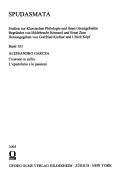
ISBN: 3487128314 Year: 2005 Volume: 103 Publisher: Hildesheim : G. Olms,
Abstract | Keywords | Export | Availability | Bookmark
 Loading...
Loading...Choose an application
- Reference Manager
- EndNote
- RefWorks (Direct export to RefWorks)
Exile (Punishment) in literature --- Exiles --- Bannissement dans la littérature --- Exilés --- Cicero, Marcus Tullius --- Correspondence. --- Exile. --- Authors, Latin --- Latin letters --- Letter writing, Latin --- Statesmen --- Correspondence --- History and criticism. --- History --- Homes and haunts --- Macedonia --- Historiography. --- Cicéron --- Exil --- Correspondance --- Bannissement dans la littérature --- Exilés --- Public officers --- Persons --- Aliens --- Deportees --- Refugees --- Authors, Roman --- Latin authors --- Roman authors --- Correspondence&delete& --- History and criticism --- Cicero --- Cicerone, M. T. --- Cicéron, Marcus --- Macedon --- Makedhonia --- Makedonia --- Makedoniya --- Makedonja --- M. Tulli Ciceronis --- T︠S︡it︠s︡eron, Mark Tulliĭ --- Cyceron --- Cicéron --- Kikerōn --- Cicerón, M. Tulio --- Ḳiḳero --- Cicerone --- Cicerón, Marco Tulio --- Ḳiḳero, Marḳus Ṭulyus --- Tullius Cicero, Marcus --- Kikerōn, M. T. --- Cicerone, M. Tullio --- Cicero, M. T. --- Cyceron, Marek Tulliusz --- ציצרון, מארקוס טולליוס --- קיקרו, מארקוס טוליוס --- קיקרו, מרקוס טוליוס --- キケロ --- 西塞罗 --- Correspondance.
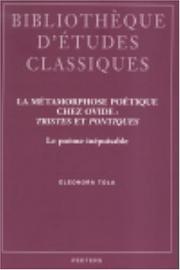
ISBN: 9042914076 2877237672 9789042914070 9782877237673 Year: 2004 Volume: 38 Publisher: Louvain: Peeters,
Abstract | Keywords | Export | Availability | Bookmark
 Loading...
Loading...Choose an application
- Reference Manager
- EndNote
- RefWorks (Direct export to RefWorks)
Bannelingen in de literatuur --- Bestraffing in de literatuur --- Exiles in literature --- Exilés dans la littérature --- Gedaanteverwisseling in de literatuur --- Metamorphose dans la litterature --- Metamorphosis in literature --- Punishment in literature --- Punition dans la litérature --- Epistolary poetry, Latin --- Elegiac poetry, Latin --- Exile (Punishment) in literature. --- Metamorphosis in literature. --- Exiles in literature. --- Exiles --- Poésie épistolaire latine --- Poésie élégiaque latine --- Bannissement dans la littérature --- Métamorphose dans la littérature --- Exilés --- History and criticism. --- Histoire et critique --- Ovid, --- Poets, Latin --- Exile (Punishment) in literature --- Homes and haunts --- History and criticism --- Poésie épistolaire latine --- Poésie élégiaque latine --- Bannissement dans la littérature --- Métamorphose dans la littérature --- Exilés dans la littérature --- Exilés --- Latin poets --- Persons --- Aliens --- Deportees --- Refugees --- Constanța (Romania) --- Tomes (Romania) --- Constantza (Romania) --- Kustenji (Romania) --- Kustendjie (Romania) --- Constanța, Romania (City) --- Tomis (Romania) --- Tomi (Romania) --- Κωνστάντζα (Romania) --- Kōnstantza (Romania) --- Κωνστάντια (Romania) --- Kōnstantia (Romania) --- Кюстенджа (Romania) --- Ki︠o︡stendzha (Romania) --- Констанца (Romania) --- Konstant︠s︡a (Romania) --- Köstence (Romania) --- In literature. --- Ovid --- Elegiac poetry [Latin ] --- Epistolary poetry [Latin ] --- Métamorphose (littérature) --- Épîtres en vers latines --- Élégies latines --- Ovide --- Critique et interprétation --- Rome --- Critique et interprétation. --- Histoire et critique. --- Poets, Latin - Homes and haunts - Romania - Constanta --- Epistolary poetry, Latin - History and criticism --- Elegiac poetry, Latin - History and criticism --- Exiles - Rome --- Ovid, - 43 B.C.-17 or 18 A.D. - Tristia --- Ovid, - 43 B.C.-17 or 18 A.D. - Epistulae ex Ponto --- Métamorphose (littérature) --- Épîtres en vers latines --- Élégies latines --- Critique et interprétation.
Book
ISBN: 9789004170766 9004170766 9786612400032 1282400037 9047424077 9789047424079 661240003X 9781282400030 Year: 2009 Volume: 309 Publisher: Leiden Boston
Abstract | Keywords | Export | Availability | Bookmark
 Loading...
Loading...Choose an application
- Reference Manager
- EndNote
- RefWorks (Direct export to RefWorks)
In response to being exiled to the Black Sea by the Roman emperor Augustus in 8 AD, Ovid began to compose the Tristia and Epistulae ex Ponto and to create for himself a place of intellectual refuge. From there he was able to reflect out loud on how and why his own art had been legally banned and left for dead on the margins of the empire. As the last of the Augustan poets, Ovid was in a unique position to take stock of his own standing and of the place of poetry itself in a culture deeply restructured during the lengthy rule of Rome's first emperor. This study considers exile in the Tristia and Epistulae ex Ponto as a place of genuine suffering and a metaphor for poetry's marginalization from the imperial city. It analyzes, in particular, Ovid's representation of himself and the emperor Augustus against the background of Roman religion, law, and poetry.
Exiles --- Exile (Punishment) in literature --- Exiles in literature --- Poets, Latin --- Ovid, --- Exile --- Homes and haunts --- Constanța (Romania) --- In literature --- Exile (Punishment) in literature. --- Exiles in literature. --- Exile. --- In literature. --- Exilés --- Bannissement dans la littérature --- Exilés dans la littérature --- Poètes latins --- Biography --- Biography. --- Biographies --- Biographie --- Constanta (Roumanie) --- Dans la littérature --- Persons --- Aliens --- Deportees --- Refugees --- Nasó, P. Ovidi, --- Naso, Publius Ovidius, --- Nazon, --- Ouidio, --- Ovide, --- Ovidi, --- Ovidi Nasó, P., --- Ovidiĭ, --- Ovidiĭ Nazon, Publiĭ, --- Ovidio, --- Ovidio Nasón, P., --- Ovidio Nasone, Publio, --- Ovidios, --- Ovidiu, --- Ovidius Naso, P., --- Ovidius Naso, Publius, --- Owidiusz, --- P. Ovidius Naso, --- Publiĭ Ovidiĭ Nazon, --- Publio Ovidio Nasone, --- Ūvīd, --- אוביד, --- Tomes (Romania) --- Constantza (Romania) --- Kustenji (Romania) --- Kustendjie (Romania) --- Constanța, Romania (City) --- Tomis (Romania) --- Tomi (Romania) --- Κωνστάντζα (Romania) --- Kōnstantza (Romania) --- Κωνστάντια (Romania) --- Kōnstantia (Romania) --- Кюстенджа (Romania) --- Ki︠o︡stendzha (Romania) --- Констанца (Romania) --- Konstant︠s︡a (Romania) --- Köstence (Romania) --- Ovid --- Exiles - Rome - Biography --- Poets, Latin - Biography --- Ovid, - 43 B.C.-17 or 18 A.D. - Exile --- Ovid, - 43 B.C.-17 or 18 A.D. - Tristia --- Ovid, - 43 B.C.-17 or 18 A.D. - Epistulae ex Ponto --- Ovid, - 43 B.C.-17 or 18 A.D. - Homes and haunts - Romania - Constanța --- Constanța (Romania) - In literature --- Ovid, - 43 B.C.-17 or 18 A.D. --- Constanta (Romania)
| Listing 1 - 8 of 8 |
Sort by
|

 Search
Search Feedback
Feedback About UniCat
About UniCat  Help
Help News
News